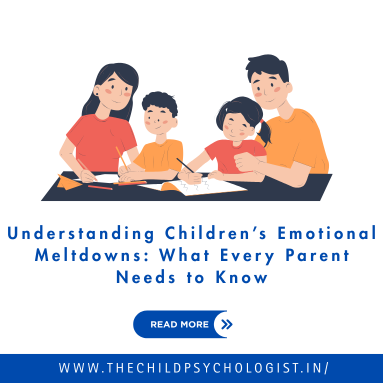Emotional meltdowns in children aren’t just “bad behavior.” They can be signs of stress, anxiety, or underlying brain development issues. Recognizing these early signs and offering the right support can prevent long-term struggles like anxiety, impulse control problems, and other childhood disorders.
If your child often cries, screams, or hits during stressful moments, it’s not always a tantrum to be ignored. Research shows that emotionally attuned parenting helps build resilience and self-regulation, while harsh responses or neglect can cause lasting harm.
What Experts Say:
- Children frequently overwhelmed by stress are at risk of anxiety and impulse control issues. (Yale Child Study Center)
- Calm, supportive interactions strengthen the brain’s prefrontal cortex, improving emotional regulation. (Dr. Allan Schore, UCLA)
- Harsh punishment increases cortisol, harming brain development. (Harvard Center on the Developing Child)
- Apologizing and repairing conflicts teaches emotional intelligence and trust. (Dan Siegel)
5 Common Myths About Emotional Meltdowns – And the Truth
- Myth: “All kids throw tantrums. It’s normal. Just ignore it.”
Truth: Frequent meltdowns may signal emotional dysregulation and stress—not simply bad behavior. - Myth: “Let them cry it out. They’ll toughen up.”
Truth: Ignoring distress can lead to anxiety and shut down, while emotional support builds coping skills. - Myth: “He’s just seeking attention!”
Truth: Acting out is often a way for children to seek connection and feel seen, especially during difficult moments. - Myth: “I was punished harshly and I turned out fine.”
Truth: Harsh discipline can harm brain development and increase stress levels, potentially leading to childhood disorders. - Myth: “Saying sorry weakens authority.”
Truth: Admitting mistakes builds trust, teaches emotional repair, and strengthens parent-child bonds.
What You Can Do Right Now
– Name your child’s emotions (“You’re really upset.”)
– Offer calm presence before trying to solve the problem
– Regulate your reactions—your calmness helps them feel safe
– Stay connected after meltdowns, not distant
– Seek professional help from a counselor therapist experienced in childhood disorders and behaviour counselling
Supporting Research
| Finding | Source |
| Co-regulated children have better emotional control | Dr. Bruce Perry, Child Trauma Academy |
| Yelling increases aggression | University of Pittsburgh Study |
| Touch and eye contact soothe the nervous system | Dr. Margot Sunderland, UK |
Final Thought
Your child isn’t “too sensitive.” Their brain is still developing. Rather than dismissing outbursts as misbehavior, ask:
– “What are they trying to express?”
– “How can I support them in this moment?”
Behind every emotional meltdown is a child silently asking: “Help me—I’m overwhelmed.”
